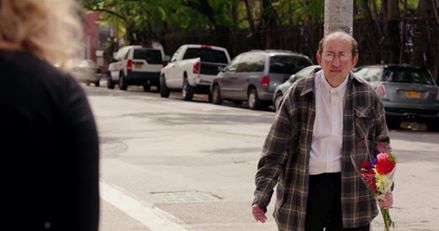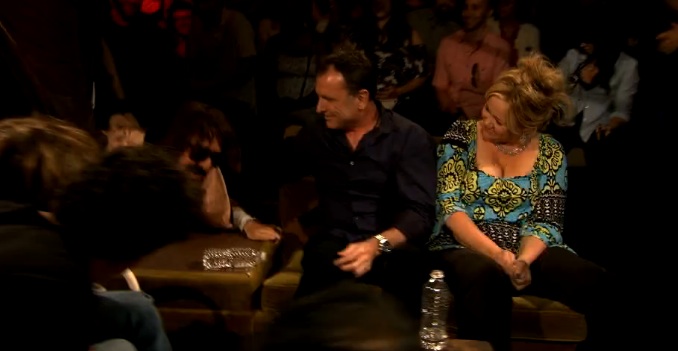Gary Marinoff held a bachelor’s degree from the John Jay College of Criminal Justice, but when he died last week suddenly from a brain hemorrhage at 56, Marinoff never quite achieved his dreams of becoming “the next Woody Allen or Groucho Marx,” but as his sister, Janet, wrote on Facebook, “he never stopped trying.”
Marinoff did appear as an extra in the background of several 30 Rock episodes, portraying the stage manager for fictional sketch show TGS, almost but never quite getting a speaking line on the award-winning NBC sitcom. Tina Fey did bring him, back, though, online for a cameo in Netflix’s Unbreakable Kimmy Schmidt.
There was something equally unbreakable about Marinoff, who was a fixture at open mic nights for both comedy and poetry in New York City from 1984 up until his death.
Every comedy scene has at least one open miker perpetually ubiquitous to that scene. Marinoff may never have “made it” as a comedy star himself, but he interacted with so many comedians who also pursued their dreams over the past three decades, that he inevitably touched more lives and careers than he ever knew.
What do you make of a comedian like Marinoff? My only vivid memory of Marinoff is when I happened to sit next to him outside on the back patio of The Creek and The Cave one night this July — he mostly kept to himself, so I didn’t quite know what to make him myself. My friend, comedian and podcaster Liam McEneaney, was sitting there already. He knew Marinoff, and McEneaney wrote a fitting tribute to Marinoff, ending his eulogy so:
The last time I saw Gary, I was on my way to the mall in my neighborhood in Queens to buy sneakers. I was walking down a street I never travel, and about twenty feet ahead I saw him, shuffling, bald, bowed. We walked and talked, and when we got to the mall entrance it began pouring, so we stepped inside and talked some more. He told me he lived in a room in a Chinese family’s home in Corona. He called it the nicest neighborhood he could want to live in, and I guess if you’re a small, stocky middle-aged Jewish man with a pronounced speech defect who had spent the last few years moving through the shelter system of New York and Hollywood, Florida, it would be.
But here’s the thing you might not catch about that, because what i said is incredibly sad. But that was the day that Gary taught me gratitude. He taught me dignity, and he taught me grace. Not just in a “There but for fortune” way. We who do comedy, who pursue the creative fields as a full-time job, tend to get angry about the short-term, about the gigs we didn’t get, the shows we didn’t get booked on. Gary had none of that. If he didn’t teach me the finer qualities of the human spirit, he certainly served as a reminder that they exist. Yes, he had his frustrations, and he had his down moments, but he never once stopped feeling gratitude for the small blessings he found every day in his life.
This was a man who had been given every right by this world to be bitter, to spit venom, to curse the heavens and stomp the ground until the shaking reached Hell. but instead he kept his eyes down and focused on the things he could focus on.
If Gary were reading this, I know he would want me to talk less about his character and more about his comedy. If you watch footage of his act, you’ll notice he lacks the things that most great comedians know innately; joke construction, comic timing, an ability to read an audience. But he made me laugh like hell, and many other audience members blindsided by his comedy style. If a comedian could be called a folk artist, Gary was a folk artist of the first caliber.
Gary wrote poetry. He self-published a chapbook. Gary wrote original rap, which he would perform a cappella at the drop of a hat. Gary did standup comedy, he did improv, he loved performing for an audience wherever he could find one. And whatever you may think of his performance—and not everyone was a fan—Gary had the soul of a first-rate artist. In that, he felt a compulsion to create and to share, purely for the reward that comes in the joy of creating and sharing.
And if his material was oddly filthy for someone who was determined to perform on the Tonight Show, then so be it. That was Gary’s dream.
From Janet Marinoff, Gary’s sister: “Gary was one of a kind. He lived life on his terms, and even when he fell on very tough times, which he did often, he dusted himself off, found an open mic somewhere and made people laugh. He loved the spotlight and was fearless, said anything he wanted to, no matter how off the wall or off color. Didn’t matter, it was his view of the world and he was hell bent on sharing it. Comedy was his life and he performed whenever he had the chance up until the very end. Thankfully, his legacy will live on forever on YouTube. He was also very socially conscious. He worked tirelessly on political campaigns that focused on helping the poor, homeless, and anyone less fortunate. He wanted everyone to have the chance to lead a better, happier life in this crazy world we live in.”
NYC comedians will gather tonight to share stories, photo and footage of Gary Marinoff.


